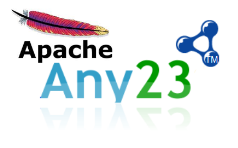Apache Any23 Installation Guide
This page describes how to install Apache Any23.
Download a Stable Distribution
Most users probably don't need to have day to day access to the source code as it changes. For these users we provide distribution packages via our downloads page. Download either the ".zip" or ".tar.gz" file and extract the archive.
Installing the Core
Windows 2000/XP
- Unzip the distribution archive, i.e.
apache-any23-2.8-SNAPSHOT-bin.zipto the directory you wish to install Apache Any23 2.8-SNAPSHOT. These instructions assume you choseC:\Program Files\Apache Software Foundation. The subdirectoryapache-any23-2.8-SNAPSHOTwill be created from the archive. - Add the
ANY23_HOMEenvironment variable by opening up the system properties (WinKey + Pause), selecting the "Advanced" tab, and the "Environment Variables" button, then adding theANY23_HOMEvariable in the user variables with the valueC:\Program Files\Apache Software Foundation\apache-any23-2.8-SNAPSHOT. - In the same dialog, add the
ANY23environment variable in the user variables with the value%ANY23_HOME%\bin. - Optional: In the same dialog, add the
EXTRA_JVM_ARGUMENTSenvironment variable in the user variables to specify JVM properties, e.g. the value-Xms256m -Xmx512m. This environment variable can be used to supply extra options. By default, it is set to:-Xms500m -Xmx500m -XX:PermSize=128m -XX:-UseGCOverheadLimit. - In the same dialog, update/create the Path environment variable in the user variables and prepend the value
%ANY23%to add Apache Any23 available in the command line. - In the same dialog, make sure that
JAVA_HOMEexists in your user variables or in the system variables and it is set to the location of your JDK, e.g.C:\Program Files\Java\jdk1.5.0_02and that%JAVA_HOME%\binis in your Path environment variable. - Open a new command prompt (Winkey + R then type cmd) and run
any23 --versionto verify that it is correctly installed.
Unix-based Operating Systems (Linux, Solaris and Mac OS X)
- Extract the distribution archive, i.e.
apache-any23-2.8-SNAPSHOT-bin.tar.gzto the directory you wish to install Apache Any23 2.8-SNAPSHOT. These instructions assume you chose/usr/local/apache-any23. The subdirectoryapache-any23-2.8-SNAPSHOTwill be created from the archive. - In a command terminal, add the
ANY23_HOMEenvironment variable, e.g.export ANY23_HOME=/usr/local/apache-any23/apache-any23-2.8-SNAPSHOT. - Add the
ANY23environment variable, e.g.export ANY23=$ANY23_HOME/bin. - Optional: Add the
EXTRA_JVM_ARGUMENTSenvironment variable to specify JVM properties, e.g.export EXTRA_JVM_ARGUMENTS="-Xms256m -Xmx512m". This environment variable can be used to supply extra options. - Add M2 environment variable to your path, e.g.
export PATH=$ANY23:$PATH. - Make sure that
JAVA_HOMEis set to the location of your JDK, e.g.export JAVA_HOME=/usr/java/jdk1.5.0_02and that$JAVA_HOME/binis in your PATH environment variable. - Run
any23 --versionto verify that it is correctly installed.
Installing a plugin
Windows 2000/XP
- Unzip the distribution archive, i.e.
apache-$plugin.name-bin.zipThe subdirectoryapache-$plugin.namewill be created from the archive. - Copy the jar files under
C:\Documents and Settings<username>\.any23\plugins
Unix-based Operating Systems (Linux, Solaris and Mac OS X)
- Extract the distribution archive, i.e.
apache-$plugin.name-bin.tar.gz. The subdirectoryapache-$plugin.namewill be created from the archive. - Copy the jar files under
~/.any23/plugins
Installing the service
Installing the standalone server
Windows 2000/XP
- Unzip the distribution archive, i.e.
apache-any23-service-2.8-SNAPSHOT-bin-server-embedded.zipto the directory you wish to install Apache Any23 2.8-SNAPSHOT. These instructions assume you choseC:\Program Files\Apache Software Foundation. The subdirectoryapache-2.8-SNAPSHOT-server-embeddedwill be created from the archive. - Add the
ANY23_HOMEenvironment variable by opening up the system properties (WinKey + Pause), selecting the "Advanced" tab, and the "Environment Variables" button, then adding theANY23_HOMEvariable in the user variables with the valueC:\Program Files\Apache Software Foundation\apache-2.8-SNAPSHOT. - In the same dialog, add the
ANY23environment variable in the user variables with the value%ANY23_HOME%\bin. - Optional: In the same dialog, add the
EXTRA_JVM_ARGUMENTSenvironment variable in the user variables to specify JVM properties, e.g. the value-Xms256m -Xmx512m. This environment variable can be used to supply extra options. By default, it is set to:-Xms500m -Xmx500m -XX:PermSize=128m -XX:-UseGCOverheadLimit. - In the same dialog, update/create the Path environment variable in the user variables and prepend the value
%ANY23%to add Apache Any23 available in the command line. - In the same dialog, make sure that
JAVA_HOMEexists in your user variables or in the system variables and it is set to the location of your JDK, e.g.C:\Program Files\Java\jdk1.5.0_02and that%JAVA_HOME%\binis in your Path environment variable. - Open a new command prompt (Winkey + R then type cmd) and run
any23serverto launch the service.
Unix-based Operating Systems (Linux, Solaris and Mac OS X)
- Extract the distribution archive, i.e.
apache-2.8-SNAPSHOT-bin-server-embedded.tar.gzto the directory you wish to install Apache Any23 2.8-SNAPSHOT. These instructions assume you chose/usr/local/apache-any23. The subdirectoryapache-2.8-SNAPSHOT-server-embeddedwill be created from the archive. - In a command terminal, add the
ANY23_HOMEenvironment variable, e.g.export ANY23_HOME=/usr/local/apache-any23/apache-2.8-SNAPSHOT-server-embedded. - Add the
ANY23environment variable, e.g.export ANY23=$ANY23_HOME/bin. - Optional: Add the
EXTRA_JVM_ARGUMENTSenvironment variable to specify JVM properties, e.g.export EXTRA_JVM_ARGUMENTS="-Xms256m -Xmx512m". This environment variable can be used to supply extra options. - Add
ANY23environment variable to your path, e.g.export PATH=$ANY23:$PATH. - Make sure that
JAVA_HOMEis set to the location of your JDK, e.g.export JAVA_HOME=/usr/java/jdk1.5.0_02and that$JAVA_HOME/binis in your PATH environment variable. - Run
any23serverto launch the service.



